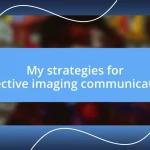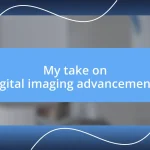Key takeaways:
- Gene editing techniques like CRISPR, zinc finger nucleases, and TALENs offer vast potential for eradicating genetic diseases and enhancing agriculture, but they raise significant ethical concerns about consent and societal implications.
- The public opinion on gene editing is divided, with many expressing hope for disease eradication while others fear ethical dilemmas, inequity, and the potential to ‘design’ humans.
- The regulatory landscape for gene editing varies globally, emphasizing the need for adaptable frameworks that reflect public values and ensure safe, fair access to the technology as it evolves.

Understanding gene editing techniques
When I first delved into gene editing, the science behind CRISPR caught my attention immediately. It’s fascinating how this technique allows scientists to snip DNA at specific points, which feels almost like a biological version of editing a document. Have you ever thought about how we can now potentially eradicate genetic diseases? It’s remarkable, yet it raises a plethora of ethical questions.
Zinc finger nucleases and TALENs are also significant tools in this realm. My initial impression was that their complexity could be overwhelming, but I learned that these techniques essentially function like molecular scissors, each with its unique precision. Isn’t it mind-boggling to consider how targeted manipulation can lead to profound advancements in medicine?
One aspect that truly left me in awe is the potential these techniques have for agriculture. I remember reading about crops that can withstand harsher climates, thanks to gene editing. It made me wonder—what does it mean for food security? This blending of science and sustainability makes gene editing a topic that stirs not just curiosity but also a sense of responsibility for our future.

Ethical implications of gene editing
The ethical implications of gene editing are deeply layered. I often find myself pondering the idea of consent—how do we get permission from future generations for modifications made today? When I think about the power of gene editing, I can’t help but feel a mixture of excitement and apprehension. Imagine altering an individual’s genes before they’re even born; it sounds like science fiction but it’s becoming our reality. What happens when we start to design “ideal” humans?
In my experience, it becomes crucial to distinguish between therapeutic and enhancement applications of gene editing. The former aims to eliminate diseases, which feels ethically sound; the latter could lead to a world where traits, like intelligence or physical ability, could be manipulated. I recall a recent conversation with a friend who works in genetics. He shared concerns about the societal divide that might arise from enhanced individuals living alongside those who remain unedited. This isn’t just a scientific issue; it’s a philosophical one.
Moreover, the potential for unintended consequences is another ethical gray area. When we tinker with genomes, we’re playing a game of chance. What if a well-intentioned gene edit leads to unforeseen health issues? My thoughts rush back to discussions in my biology class about the delicate balance of ecosystems; I see parallels in the human genome. It underscores the urgency for a robust ethical framework. How can we responsibly navigate this powerful technology?
| Aspect | Consideration |
|---|---|
| Consent | Future generations cannot consent to gene edits made today |
| Therapeutic vs. Enhancement | Balancing between curing diseases and creating “ideal” traits |
| Unintended Consequences | Risk of unforeseen health issues from edits |

Public opinion on gene editing
The public’s opinion on gene editing is a mixed bag, reflecting both excitement and apprehension. I remember a community forum I attended where the topic arose. People were eager to embrace the potential of eradicating genetic diseases, yet some expressed deep ethical concerns, worrying about where gene editing could lead. It’s intriguing how the same technology can inspire hope in some while instilling fear in others.
Here are a few key points that capture the public sentiment:
- Hope for Disease Eradication: Many see gene editing as a revolutionary opportunity to eliminate hereditary diseases, providing a sense of optimism for future generations.
- Ethical Concerns: A significant portion of the population worries about the moral implications, specifically regarding consent and playing God with human genetics.
- Fear of Inequality: There’s apprehension that gene editing could exacerbate social divides, where only the wealthy could afford enhancements, creating a new class of “edited” individuals.
The more I explore these views, the more I realize how complex this issue is. Personal stories often echo these sentiments. For example, I spoke to a mother whose child has a genetic disorder, and her hope for a future without such conditions is palpable. Yet, even she questions what could happen if gene editing morphs into something more radical, like designing traits that society deems “desirable.” This duality in public opinion illustrates the need for ongoing discussions and education around the ethical landscape of gene editing.

Regulatory landscape for gene editing
Navigating the regulatory landscape of gene editing is a complex endeavor that varies significantly across the globe. I recall attending a scientific symposium where experts discussed how different countries have vastly different approaches to regulation. For instance, in the U.S., the FDA primarily oversees gene editing technologies, focusing on safety and efficacy, whereas European regulations tend to be more precautionary. This disparity can create confusion and pose challenges for researchers who want to collaborate internationally.
Another intriguing aspect is the involvement of ethics boards and public consultation in the regulatory process. I remember being part of a focus group that debated the ethical implications of CRISPR technology. The diversity of opinions highlighted the necessity of community voices in shaping regulations. It’s critical that we engage the public in discussions about gene editing, as their perspectives can inform policies that reflect societal values. How can policymakers ensure that regulations keep pace with rapid advancements in science?
As the technology evolves, so does the need for adaptive and responsive regulatory frameworks. I often think about the pace at which gene editing is advancing and wonder whether our existing laws can keep up. For example, the rapid progress in gene therapies for rare diseases often outstrips the slow-moving legislative processes designed to evaluate them. This makes me question whether our current regulatory mechanisms are equipped to protect public health while fostering innovation. Balancing these two aspects is no easy feat, yet it’s essential if we want to responsibly harness the promise of gene editing.

Future of ethical gene editing
The future of ethical gene editing is poised to be both transformative and challenging. I recall a lively discussion I had with a close friend, who is a geneticist, about how advancements might soon enable us not just to treat genetic disorders but to enhance human capabilities. Can we truly separate the medical benefits from the ethical dilemmas that come with such abilities? That’s a question I find myself pondering more often as the technology matures.
As we look ahead, I’m increasingly concerned about the societal implications of gene editing. In conversations with my peers, I’ve heard fears that this technology might lead to a world where genetic modifications could become a privilege for the wealthy. Imagine a future where access to genetic enhancements is determined by economic status, potentially widening the gap between different social classes. That thought alone brings a sense of urgency to the discussions surrounding equitable access and regulation.
Moreover, I haven’t been able to shake the feeling that public engagement is critical for the path forward. Participating in a community seminar opened my eyes to the diverse opinions people hold about gene editing. From hope to skepticism, each perspective is invaluable in framing ethical guidelines that resonate with society. How can we create a future where innovation and ethics coexist harmoniously? Clearly, ongoing dialogue and education will be fundamental to ensuring that gene editing benefits everyone, not just a select few.














